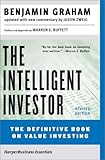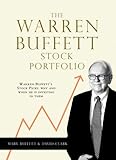The Intelligent Investor [Revised Edition]
Price: [wpramaprice asin=”B0002X1JKU”]
[wpramareviews asin=”B0002X1JKU”]
The Warren Buffett Stock Portfolio
Warren Buffett’s Stock Portfolio is the first book to take readers deep into Warren Buffett’s investment portfolio.
Each of Buffett’s current stock investments is analyzed in detail with information as to why Buffett found these attractive businesses and how he determined that they are good long-term investments. Each company will analyzed using the criteria outlined in Buffettology and Warren Buffett and the Interpretation of Financial Statements. The reader can then apply these techniques t
Price: [wpramaprice asin=”B006J3FNUO”]
[wpramareviews asin=”B006J3FNUO”]





Two books: one old and good, one new and bad,
This edition of The Intelligent Investor is really two books in one. There is the original 1973 edition of Ben Graham’s classic on “value investing” and then a commentary on each chapter by Jason Zweig.
Graham’s text is solid, a little heavy, sometimes a little out of date, and some of his tables a bit user-unfriendly; but no matter: it is the timeless lessons he teaches that matter. He is very methodical, a bit mathematical and — if you follow him all the way — will leave you with a good grounding in how to approach the stock market.
Basically his gospel is this: ignore all the hype and blather around the stockmarket. Invest for the long-term in big, rock-steady, simple businesses, after analysing them with a few financial criteria. But only buy when the market is offering them at a bargain price.
Unfortunately, each of Graham’s sober tutorials is followed by a commentary by Zweig. He may claim to be a disciple of the great man, but he is certainly not cut from the same cloth. Zweig is just one more financial markets cheerleader: repetitive, pushy, and rolling out the same old disaster stories from the dot.com era ad nauseam, supposedly to show how wise Graham was (in case you didn’t understand Graham’s chapter). He also repeatedly cites his own magazine and keeps naming the same fund, which is annoying at the very least. He also resorts to a lot of “if you had bought shares on every third Wednesday since 1974 you would have made a 3,859 percent return!!” kind of hocus-pocus which is a complete waste of time.
Zweig could have used the opportunity to unpick some of the knottier points of Graham’s book and help readers understand the harder parts. The worst thing is that he sometimes goes against Graham’s teachings, so he should NOT be taken as an extension of Graham! (For example, on page 129 he says if you don’t have time to choose your own stocks, there’s no shame in hiring someone to pick them for you. On page 243, he says “In the financial markets, luck is more important than skill”. Ben Graham must be turning in his grave.)
One more caveat: this volume boasts a preface and appendix by Warren Buffett, Ben Graham’s most famous pupil. But don’t be swayed by that. The preface is an obituary written by Buffett and the appendix is an edited talk that Buffett gave in 1984. They’re okay but it doesn’t mean that Buffett is backing this schizoid volume.
My advice: read the Graham chapters, ditch the Zweig commentary. You’ll save time AND be wiser.
Was this review helpful to you?

|The gold standard in investment titles,
This classic book on investing belongs on the bookshelf of every investor. The principles that Benjamin Graham outlines are the very precepts that guided such great investors as Warren Buffett, and such mutual fund innovators as John Bogle, the noted Vanguard Group founder, who wrote this edition’s foreword. First published in 1949, the text shows a few signs of age, most notably in its discussion of interest rates, investment vehicles such as savings bonds and other time-sensitive subjects. However, those are minor issues. When Benjamin Graham writes about categories of investors, approaches to security analysis, the proper disposition investors should have toward market moves, and other fundamental investment subjects, his advice is timeless. We highly recommend this seminal book.
Was this review helpful to you?

|Invest In This Book, Invest In Yourself,
With more than one million copies sold and an endorsement on the cover by Warren Buffet, you know there has to be something to this book- and I think I know why. Simply because it is the first book ever to describe the emotional framework and analytical tools necessary for financial success for individual investors.
Probably the single best book on investing written for the lay-public and the stock market bible since its first appearance in 1949, it’s a great resource, although it’s quite a thick book and filled with detail- and probably not for anybody but the serious stock market investor. And if getting motivated to start investing is your problem, suggest The Sixty-Second Motivator. Good luck!
Was this review helpful to you?

|Very Interesting,
I have read a fair few books over the years on investing, valuation, and financial statements. Some have been usefull and others, maybe not usefull but entertaining. What I have concluded is that even the brightest people have to make best guesses along the way when it comes to the future value of a stock. This book has given me a method that actually makes sense using passed EPS growth and historical PE. Now I know that some investors will turn their nose up at this ethos and tell me that the method described is a load of rubbish. My answer to them is that is their opinion and they are welcome to it. A word of warning however, this book alone does not tell you everything about how to analyse a companies financial position to help you determine if it is a good comany to invest in. If you want to be able to make solid decisions about your invesments then also read the following books. The Intelligent Investor, and the Interpretation of Financial Statements by Ben Graham, The Essays of Warren Buffett by Cunningham, and Warren Buffett and the Interpretation of Financial Statements. Now if you read all these books and understand the overall Bigger Message and can apply the method described you will have more chance of success as a long term investor. I will leave you with a message from the great guy himself Warren Buffett from a speech he gave, ” Investors who can’t look at a stock and with some certainty value it like a Bond, have no business picking their own stocks”. Read this book and this statement will make more sense.
Now the bad parts: This book could have been less than 75 pages and still got the same message across, however this is only a little gripe and should not put you off reading this book.
Was this review helpful to you?

|Waste of time,
This book is all filler no thriller. There is a very small amount of useful information and that info isn’t even clear AND I have found confusing typos amongst the already confusing calculations (eg writing 2011 instead of 2002, not great when you are trying to do a calculation!) .
More than 3/4 of the book is simply filled with about 20 companies that Warren has invested. The detailed in analysis of each company is extremely repetitive.
Only buy this book if you r savy in Maths and u can get it for £2 inc p+p.
Was this review helpful to you?

|Author lifting on succes buffett,
Truly dissapointed by my purchase of this book. This book in no way tell the true story about why buffett bought certain stocks. It is simplistic and not giving a good representation of reality. For example it argues that looking at historic data and then just plugging that historic growth into a calculator will give a realistic view on what a company is worth. ( when companies get big, they tend to lose growth momentum, but not according to this book, they say growth is forever)
It also just summarizes when buffett bought certain stocks at what price and what the price is at time of publishing of the book. If you want that information, I suggest using the internet where you can get if for free.
If you truly want to learn valuation I suggest reading a big textbook on valuation from some of world’s finest finance proffessors.
This book is just a simple written book with no real value and is a way for the authors of the book to earn money on the succes of buffett.
Was this review helpful to you?

|